Follow our recap blog below for the key highlights and knowledge shared at ALSC Europe 2024. Even though the event is over, the insight doesn’t stop, and we will continue to update this blog with the most valuable insights, data and quotes from automotive experts discussing how to deliver a competitive edge, through reducing complexity, increasing flexibility and maximising capacity.
Jump to key highlights:
Dr Michael Nikolaides, BMW on market volatility
Martina Graser, Ford Europe on securing ocean-based capacity
Iza Kalinska, JLR, Sabine Isenbort, Ford Europe and Sonia Santos, Bosch on the Red Sofa
Levent Yuksel, JLR Red Sofa Interview and article on ‘win win’ opportunities for collaboration
Jean-Marc Carlicchi, Renault Group on the ‘new never-normal’
Jean Christophe Deville, Toyota Motor Europe Red Sofa Interview and article on advantageous partnerships
26 March
Watch now: Why Toyota Motor Europe isn’t looking for flexibility
Jean Christophe Deville, vice-president of supply chain at Toyota Motor Europe said he isn’t looking for flexibility in his logistics partners, and is instead looking for forecasting capabilities.
Deville said that Toyota Motor Europe has been surviving and learning from crises, and is now moving into a new phase, from survival to performance.
As part of this, he said that flexibility in logistics partners is no longer the top priority. ”I don’t think we’re after flexibility. Flexibility means last minute change, shifting from one model to another one. I think actually that’s not what we’re after, it’s the other way around. We would like to get better at is stronger planning and stronger forecasting,” he said.
Click here for the full Red Sofa Interview
22 March
Watch now: JLR’s Levent Yuksel on scaling green logistics solutions
Levent Yuksel, freight operations director, JLR sat down on the Red Sofa with Christopher Ludwig, Chief of Content, Automotive Logistics to discuss how we can scale up green automotive logistics solutions through collaboration and investment.
Click here for the full Red Sofa interview
22 March
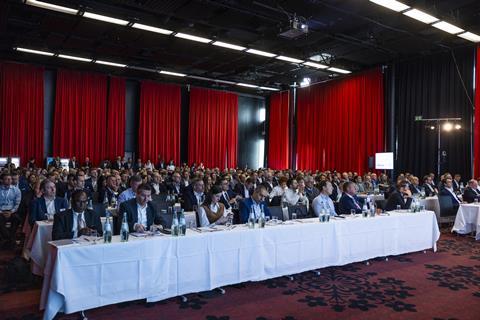
Thank you to everyone who attended ALSC Europe 2024! The event may be over, but we still have plenty more insights and takeaways from the conference to come, so keep your eyes on this blog for more news, features, Red Sofa Interviews and more.
And if you missed out this year, you can now register your interest for ALSC Europe 2025.
For more information, click here
21 March
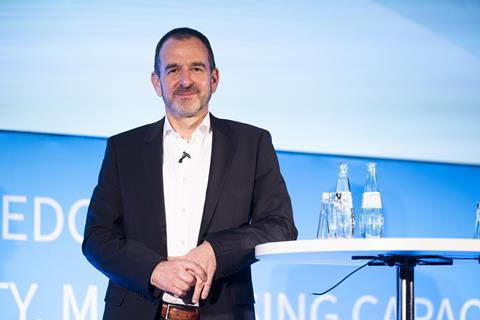
We now go to our final session of ALSC Europe, where our panel of experts will discuss how to navigate present disruptions, forge the path for the future, and steer supply chains in a volatile world.
Dr Michael Nikolaides, senior vice-president, Production Network, Supply Chain Management, Logistics, at BMW kicked off the session with a keynote.
Read the full article on Nikolaides’ keynote here
He said: ”I assure you, volatility will stay and we should prepare together for volatile market demand, geopolitical tensions and everything which might come. The automotive industry only works together with our partners and if we prepare and have the mindset of not being afraid of competitors coming to the market, be it from China or anywhere else in the world.”
In its financial results, announced today, BMW Group produced and sold 2.55m cars last year, out of that 375,000 units were purely electric globally, accounting for 15% of sales.
“We did that in a very profitable way, hit our EBIT margin of 9.8% in auto,” said Nikolaides. “We also did all that compliant with co2 regulation in Europe. Our emissions from our complete European fleet went down to 101.2 grams on average.”
21 March
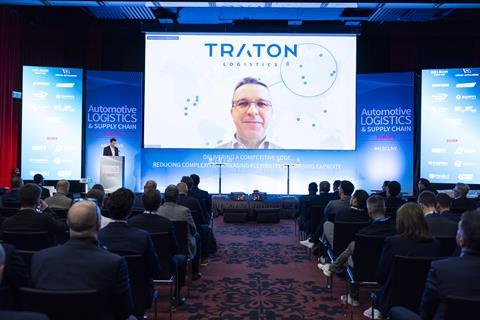
After lunch, Fabio Castello, chief logistics officer & senior vice-president of logistics at Traton Group/Scania took to the stage (virtually) to share how Traton is using a new model for synergies in commercial vehicle logistics.
He said the group started on its journey to having an integrated process two years ago, when Traton was made of four seperate brands and operations.
“There was some level of collaboration and cooperation within Traton, especially when there were new initiatives and we needed to speak to our colleagues about benchmarking, but the level of collaboration was very limited and fragmented, and our processes were not aligned,” Castello said.
”Now, during this transformation, we are identifying the two main tracks in the transformation of the business. Firstly, we set up the group logistics structure, and secondly, we identified the business value and what we can capture and harvest in terms of logistics costs and CO2 savings,” he said. “Our objective is to go from these cooperation initiatices to an integrated supply chain and process, with efficiency by design.”
21 March
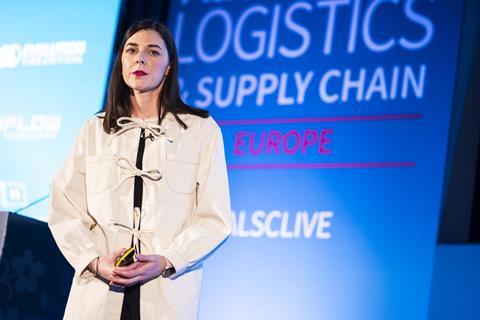
Andreea Serbu, senior manager of external affairs at ECG told delegates the “carbon clock is ticking”, but that carbon emissions are not being measured in the most precise, efficient way.
“Currently there’s a lot of room for interpretation in calculating emissions”, she said. “But calculations are based on data and default values which are used across all industries.”
Like we’ve heard throughout ALSC Europe, Serbu said that we need industry-specific calculations, partnerships and shared knowledge and understanding of emissions to make the industry greener.
21 March
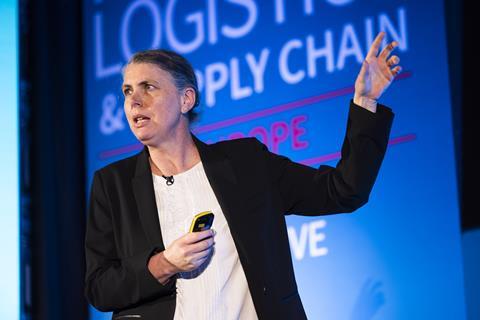
The conference has now split into two streams, and in the main conference hall we’re talking about sustainable freight, with Anouck Arnaud, director of Worldwide Transport Logistics, Mercedes-Benz Group and Levent Yuksel, freight operations director, JLR.
Arnoud said Mercedes-Benz’s goal to be net carbon neutral by 2039 along all stages of the value chain and reduce CO2 emissions by 60% in the same timeline means the OEM needs strong partnerships. “This is where we need to work together, hence why we are doing this session,” she said. ”We have a clear ambition but we are really looking forward to the exchange afterwards [with logistics partners] because it’s something we have to do together.”
21 March
We heard from Jean-Christophe Deville, vice-president of Supply Chain at Toyota Motor Europe this morning as he talked through how to form deeper, more meaningful and advantageous partnerships within the supply chain.
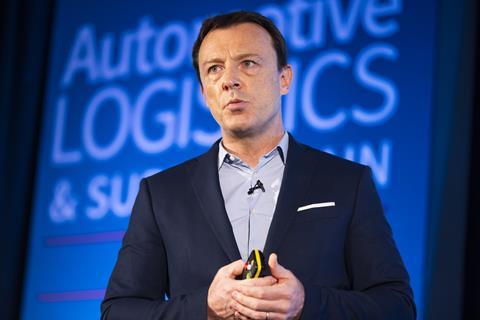
Jean-Christophe Deville, Toyota Motor Europe
He stressed the importance of forming long-term partnerships within the supply chain and the need to put in proactive effort on both sides for it to become mutually beneficial; particularly in the face of strong competition from Chinese carmakers in the EV sector.
“The Chinese carmakers are doing very well, with hugely strong ambitions, but we don’t intend to just let them grow at our expense, we’re going to fight back,” Deville said. “It’s a positive stimulus to us, as these new disruptors are waking us up.”
Joshua Schmillen, Planning Excellence Director, JLR said: “Like JC said, the long-term relationships with partners is important. I think about partnerships like having a sparring partner. You see them in the gym every day, you sometimes get jabbed in the face because you’re not paying attention, they keep you on your toes, but you both have to be in it and put in the effort to grow together.”
21 March
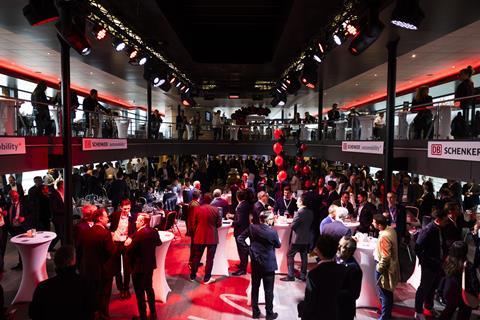
Welcome back to the final day of ALSC Europe 2024! We’re kicking off the day with a presentation of key findings from our European Automotive Logistics Market Report 2024-2034.
Christopher Ludwig, chief of content, Automotive Logistics said that the report shows quite a lot of growth in the industry, with a normalisation of freight rates.
”One of the key findings is the general fragmentation that we see, the top ten companies combined are only about 28% of the inbound market,” he said. “That drives quite a lot of competition but also some consolidation which is a trend we continue to expect as there are some pressures in the market, and it leads to some of the transactional relationships that we tend to see. We’re seeing a strong trend towards more long-term partnerships.”
Look out for the release of the full report soon on our website.
20 March
Carmakers are looking for supply chain stability after a rough ride over the last four years but while inbound logistics is more secure the capacity shortage in outbound vehicle deliveries continues to test the strategic planning of logistics managers. For Ford one of those coping strategies is to charter its own vessels and secure capacity for ocean-based vehicle deliveries, according to Martina Graser, director of material planning and logistics (MP&L) at Ford Europe, who spoke on day one of this week’s ALSC Europe conference.
As with other carmakers Ford was challenged with major capacity constraints regardless of transport mode but Graser said the focus was now mainly on congestion at the ports and compounds, with knock-on effects for inland and ocean transport.
“Shipping was one of our major concerns right from the beginning [and] it is no secret that we were one of the first OEMs to charter vessels to secure the capacity where we required it,” said Graser.
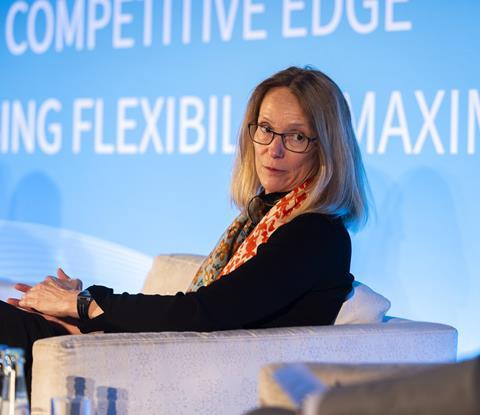
While quick to qualify that its decision to do so was not dissatisfaction with existing ocean shipping services, which remained of benefit, Graser said Ford had to become the master of its own destiny and support existing contracts with its own chartered capacity.
Part of the reason for tight capacity in ocean services is the increase in vehicle shipments from Asia to Europe. “Carriers will turn vessels around and aim at Asia-Pacific to [bring volumes] back to Europe,” said Graser. “That took out a lot of capacity for European short-sea business.”
Without that capacity, the outbound supply chain can stagnate all the way back to the plant and the last thing an MP&L director needs, according to Graser, is a call from a plant manager informing them production is stopping because the plant compound is full.
“We said we have to take control, worked early on the strategy… and we went for vessel chartering,” she said. While not a core competence for Ford Graser said there was recognition at the management level that logistics was a problem and the support was given to contract a provider to run the chartered vessels.
“We improved the flow and on our journey there are fewer port calls and that means with port and compound congestion there is less delay and better visibility of when we can deliver the vehicle to one of our customers. For us it was a big step.”
While that could be seen as requisitioning capacity away from the sector Graser was keen to highlight that the vessels are not chartered exclusively to transport Ford vehicles.
“The way we set it up is that when there is empty capacity then we are offering it on the market,” she said. “We have someone operating the vessel and managing the empty loads, and putting that on the market with other OEMs participating.”
Grasser described it as an adaptive process and it was important to keep check on what is happening in the outbound sector and how the system is adjusting to it.
“What you see now is that capacity is coming back but the port and compound congestion is still there and the network is not smooth, so there are ups and down and you have to be creative to get over the hurdles.”
Graser said this could be a short-term mitigation action rather than a long-term strategy but it was important to go with the flow, review progress and look at where your company has to adapt.
Click here for more in-depth coverage of the finished vehicle discussions at this year’s ALSC Europe conference, including input from Dennis Feddern, head of yard and workshop solutions at Inform, Kay Lemcke, chief operating officer, Sallaum Lines Switzerland, and Jaroslaw Maszczak, senior vice-president at RPM Europe
20 March
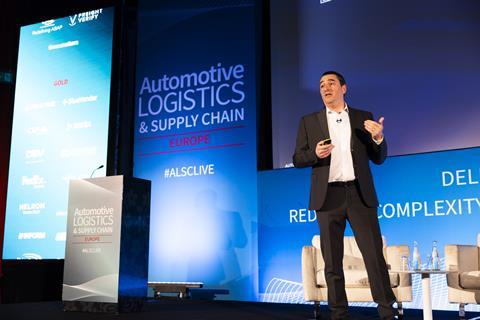
In our final session of the day (ahead of a boat ride and gala dinner along the Rhine river), we heard from Jean-Marc Carlicchi, vice-president of supply chain engineering at Renault Group.
Carlicchi spoke about planning a resilient supply chain and seeing the big picture, particularly after a few years of crisis for the industry.
“Never normal is the new normal, and this is something we have to live with,” he said. ”Knowing this, and adding that we still have to do global decarbonisation, we need to have more customer flexibility and stable industrial planning.”
He said the solution to this lies in having an “end-to-end system approach” with OEMs, tier ones, logistics providers and digital players.
Luiz Solia, vice-president and industry principal at Kinaxis added to this and said: ”Visibility is very interesting but it doesn’t tell the whole story. The digital supply chain needs to go beyond visibility to transparency – so not only seeing what’s happening but understanding the effects of it.”
Michelle Carter, supply chain director for Europe, Asia and RSA at IAC Group, went a step further, as she said we need visibility, transparency and integrity.
”Data needs to have integrity,” she said. “It should be on the balance sheet as well because we make decisions on it.”
20 March
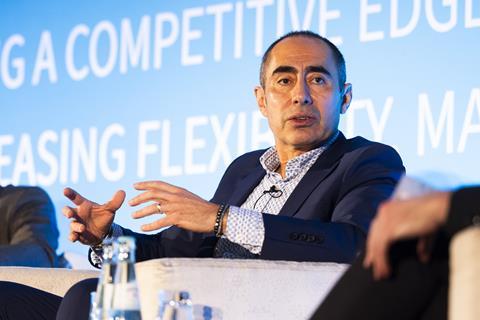
Levent Yuksel, freight operations director at JLR, told the audience of ALSC Europe about the ‘win win’ opportunities available by collaborating in the supply chain.
Having spoken at last year’s ALSC Europe event with Étienne Jacob, global supply chain director, Plastic Omnium, the two comapnies were able to identify some gaps in their supply chain opportunities for efficiency and sustainability, and as a result, collaborated to figure out solutions.
Joined on stage for the second year in a row with Jacob, Yuksel said: ”We have identified good avenues so that we can work together as a collaborative team to improve our effectiveness, for example, in packaging and more efficient transport operations which would then have a positive impact on our sustainability.”
Jacob added: ”It’s an ecosystem, and we know the sustainability solution is not coming from one single part in the supply chain, it’s a global understanding and a global effort. We see that we have flows in the same region of the world [with JLR] and can work together to find a win win.”
Yuksel recently spoke to Automotive Logistics about reducing freight emissions, which you can read here.
20 March
Sabine Isenbort, manager of inbound logistics, Ford Europe, Iza Kalinkska, lead of logistics and distribution, JLR and Sónia Santos, vice-president of worldwide manufacturing, Bosch spoke to a packed room at our first Empowering Women event at ALSC Europe.
Speaking to an audience that included young women and students, the women shared their personal and professional experiences in the automotive and logistics sectors.
Ford’s Isenbort advised that being able to shadow a female leader in an organisation provided the opportutnity to become more visible to them and the organisation.
Watch the Red Sofa Interview with Isenbort, Kalinska and Santos here
She added: ”The learning curve is never over. You need to think ’I can do it” and be there and be ready for the next step. Keep up to speed with networking, both internally and externally.”
Kalinska from JLR highlighted the importance of taking chances. “If you are being pushed out of your comfort zone, you grow. As a leader, it’s important to create that pyschological space and provide a platform for the person to show what they are capable of.”
Santos at Bosch added: “We need to start bringing women in before they go to university. It’s important to have women in logistics, not just in HR or marketing. Be authentic, have your values and keep putting yourself in the driving seat.”
For more coverage on women in the supply chain, click here.
20 March
In the opening session of ALSC Europe, Oliver Bronder, managing director vehicle logistics at VW Group Logistics, talked about the benefits of having one group logistics function with a governance role for the whole organisation able to manage the different rules and regulations on trucking and equipment cross-regionally and across all brands globally. Bronder said in relation to the development of a complex end-to-end battery supply chain or the management of capacity for finished vehicle movements, VW Group Logistics combines all sources of information into a single channel of information at board level, facilitating decision making and problem solving.
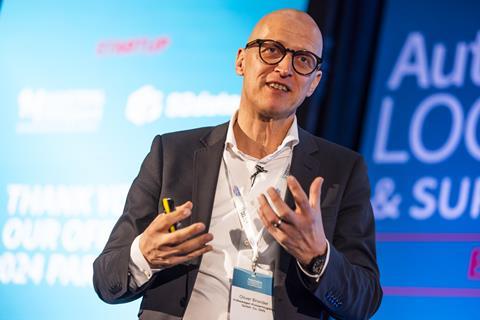
Lessons were learned during the crisis in semiconductor supply that followed the Covid pandemic and Bronder said that VW Group Logistics is driving process improvements across all different parts of the company, including manufacturing and purchasing, and identifying where to send critical parts to where they were needed in the network and organise capacity where it was needed at VW Group’s plants to support production and gain profit.
Bronder said that what is very important to the company now is quickly getting familiar with critical situations and to tackle them with calmness and precision. Doing so will help VW Group become more resilient to an industry for which disruption is the new normal. Bronder pointed to using taskforces to gather information at every level of the organisation, including shopfloor management, to enable more effective and faster decision making.
“This is a topic we have to focus on and find a new normal to be more resilient in future situations,” said Bronder.
Bronder said that transparency is important in that decision making and played its part in forecasting transport capacity constraints and that collaboration and partnerships in every part of the business supported that transparency. That also includes providing better production forecasts for its suppliers and establishing longer-term transport contracts with logistics providers where it made sense, beyond the typical three-to-five year tenders.
“We want longer contracts, and to give out bigger bundles to suppliers, [meaning] more than one transport lane but a whole area so it is more convenient and better to organise for our suppliers.”
Another important topic for VW Group is greater sustainability in transport. The company is looking at increasing the number of battery electric trucks, with pilots already in place and plans for a supporting charging infrastructure. VW Group also pushing further its use of rail, despite current restriction in Germany at the moment, especially for the movement of heavy lithium batteries and electric vehicles. Bronder said as a high-volume carmaker partnerships were important to gain additional capacity on rail and increase the volume of parts and vehicles moved by that mode.
Sustainability in ocean ro-ro is also a focus area for VW Group Logistics. To secure capacity at a time of constraint in maritime logistics VW Group has chartered its own ships and is using LNG to power them, reducing CO2 emissions by 25%. Bronder said that was just the starting point and biofuels would be used to make the fleet CO2 free, with a long term view to use synthetic C02-neutral fuels.
19 March
Matthias Braun, vice-president of logistics and digitalisation, PowerCo is kicking off ALSC Europe in a fireside chat and Q&A on the speed and change required to stay competitive in fast-changing battery supply chain and logistics.
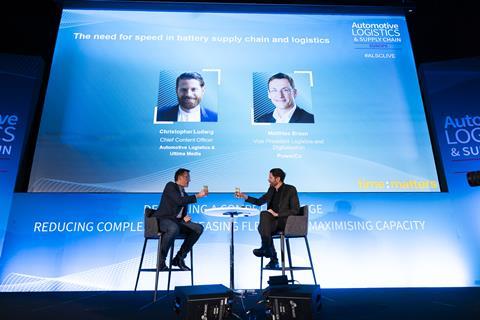
You can still register and join in online to watch the opening session on battery supply chain happening tonight at 18:45 - 19:30 CET.
Braun says there is a “need for speed” in building up - and supporting - the battery supply chain in Europe. He compares the speed of change and evolution in the battery value chain and the chemistries and technologies used, to the fast pace of consumer technology. ”It’s like a laptop, you buy it one day and the next day it’s old,” he says.
He says logistics can support in the speedy ramp-up. “As logistics, we have to be flexible and agile, because there are so many changes, in the equipment, in the materials used, even in the suppliers,” he says. “We need to be adaptable to that and have a plan B or plan C in place to support that speed that’s required, otherwise you slow down the whole process.”
Recently, Automotive Logistics had a conversation with Basquevolt, Inobat and LG Energy Solution on Europe’s leap into localised lithium battery production, aiming for sustainability and self-sufficiency amid geopolitical shifts.
Read the full article before tuning into this evening’s session!
March 15
In the wake of recent global disruptions, Europe’s leading carmakers and tier one suppliers are harnessing advanced digital technlogies to fortify their supply chains – a topic that will be discussed at ALSC Europe in our keynote panel on day one with logistics leaders from VW Group, JLR, DB Schenker and Höegh Autoliners.
Read our recent article about how to navigate the digital turn to achieve resilience and transparency here.
March 14
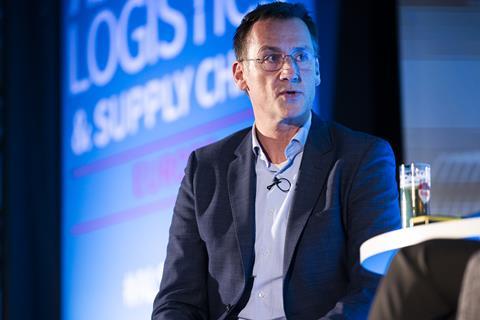
There are just five days to go until our conference kicks off with a ‘Batteries and Beers’ fireside chat! We will power the start to ALSC Europe with networking and a Q&A with Matthias Braun, vice president of logistics and digitalisation at Powerco.
Braun will discuss the need for speed in Europe’s battery supply chain and logistics as technologies rapidly develop and demand grows.
The logistics leader has previously spoken to Automotive Logistics about building a blueprint for battery logistics at VW Group’s PowerCo division, where he talked about working with operations and manufacturing to make sure that the setup of facilities is optimised for logistics requirements as well as for production.
March 13
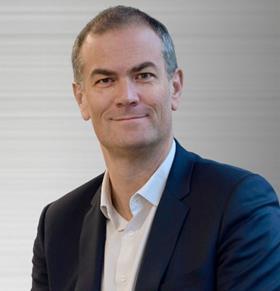
Ahead of ALSC Europe we interviewed Maxime Picat, chief purchasing and supply chain officer at Stellantis, who leads all procurement functions including logistics.
Picat talked about improving supplier relations, planning for the future of the battery supply chain, the growing influence of supply chain costs and localisation, and securing critical logistics capacity - all of which will be topics discussed in Bonn next week.
READ THE FULL EXCLUSIVE INTERVIEW HERE.
March 12
Moving towards a carbon-free future is a shared goal within automotive logistics and supply chain, and one that benefits everyone, according to Levent Yuksel, director of freight operations at JLR.
Yuksel, who will be a speaker at ALSC Europe and will also host an interactive workshop on sustainability programmes and processes, recently told Automotive Logistics that he is aiming to reduce freight emissions by up to 30% by 2030 within upstream and downstream transport and distribution.
Read the full interview with Levent Yuksel here.
March 12
In a recent feature, Automotive Logistics spoke to Ekaterina Serban, head of privacy and information security, Bosch and Mandisa Gordon, finance transformation manager, JLR about the critical need for diversity within automotive logistics and supply chain and the need to prepare the next generation of experts and leaders with different mindsets and skill sets.
At the upcoming ALSC Europe event, we will host an ’Empowering Excellence’ forum and speed networking for women in the supply chain to come together and share guidance with forward-thinking peers and leaders, to accelerate cultural change across the industry.
March 12
As we begin the countdown to ALSC Europe 2024, taking place in Kameha Grand Bonn, Germany from March 19-21, Automotive Logistics will share news and features that will tie into discussions on the main stage and feature some of the experts that will speak at the event, keeping you in the loop and armed with topics to discuss while networking over coffee in Bonn!
Oliver Bronder, head of vehicle logistics at Volkswagen Group Logistics, will be a keynote speaker at the event where he will discuss how supply chain and logistics management has been used to navigate disruption, while driving sales and production, reducing costs and emissions, be more resilient and prepare for electrification and transformation.
Recently, Volkswagen Group Logistics’ managing director Simon Motter spoke to Automotive Logistics about how the division can increasingly master disruptions and deliver on long-term goals. He said: “In logistics, we have become more relevant and able to influence decisions, both in terms of ensuring stability, but also in terms of costs and emissions.”
Read the five-part interview series here.
Automotive Logistics and Supply Chain Europe took place March 19-21 in Bonn, Germany. The conference featured major OEMs, suppliers and industry experts discussing how to leverage logistics as a competitive advantage.
Topics
- Air Freight
- ALSC EUROPE 24
- Analysis
- Battery Supply Chain
- BMW
- Circular Economy & Reverse Logistics
- Countries
- Digitalisation
- Editor's pick
- Electric Vehicles
- Europe
- Finished Vehicle Logistics
- Germany
- GM
- Green Freight & Transportation
- Inbound Logistics
- Interviews
- JLR
- Logistics service provider
- News
- People
- Ports and processors
- Purchasing
- Rail
- Region
- Road
- Shipping
- Stellantis
- Suppliers
- Supply Chain Planning
- Sustainability
- Track-and-trace
- Volkswagen
- Volvo Cars





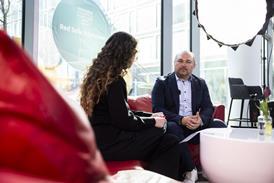

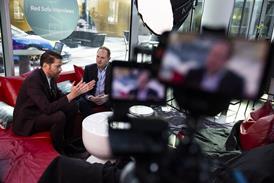

















![Global[1]](https://d3n5uof8vony13.cloudfront.net/Pictures/web/a/d/s/global1_726550.svgz)


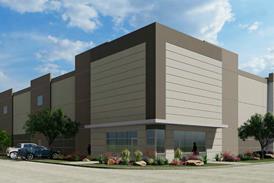




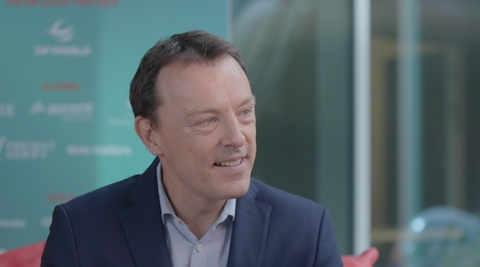
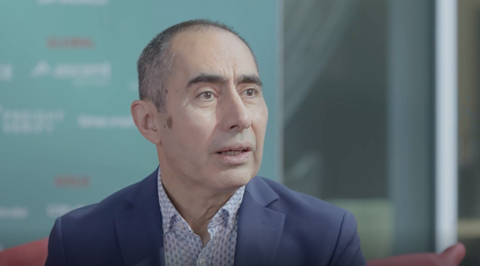
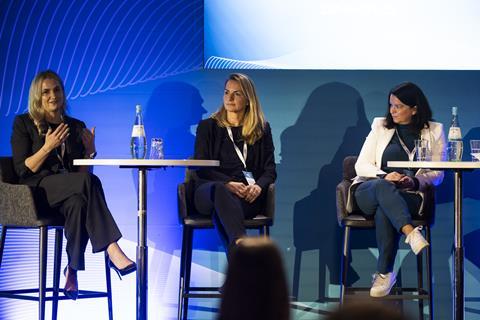
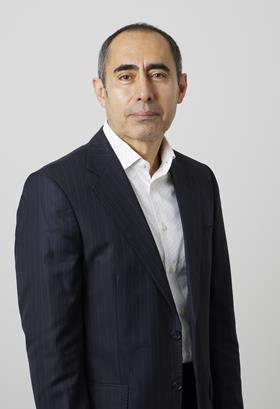
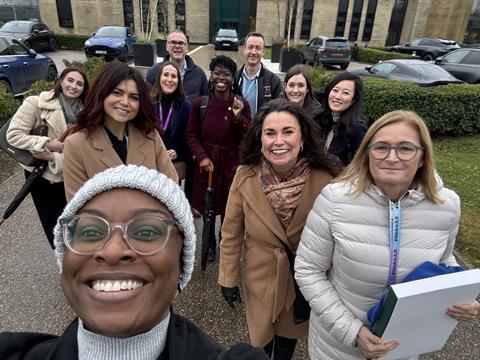
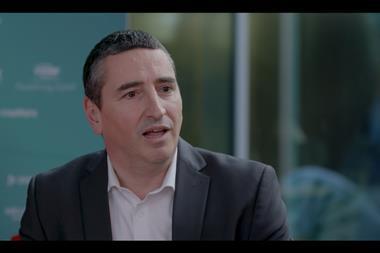


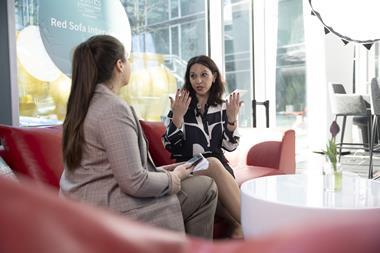

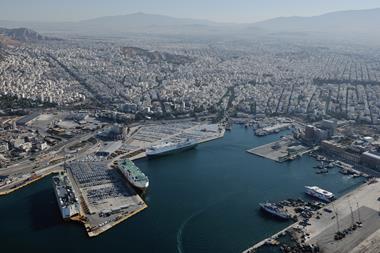



No comments yet